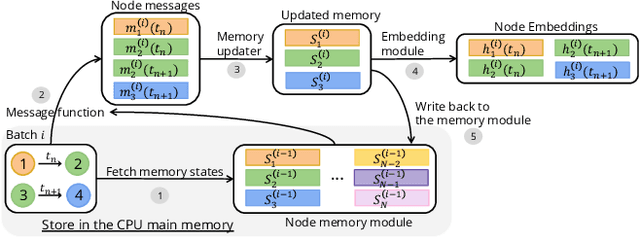MSPipe: Efficient Temporal GNN Training via Staleness-aware Pipeline
Paper and Code
Feb 23, 2024



Memory-based Temporal Graph Neural Networks (MTGNNs) are a class of temporal graph neural networks that utilize a node memory module to capture and retain long-term temporal dependencies, leading to superior performance compared to memory-less counterparts. However, the iterative reading and updating process of the memory module in MTGNNs to obtain up-to-date information needs to follow the temporal dependencies. This introduces significant overhead and limits training throughput. Existing optimizations for static GNNs are not directly applicable to MTGNNs due to differences in training paradigm, model architecture, and the absence of a memory module. Moreover, they do not effectively address the challenges posed by temporal dependencies, making them ineffective for MTGNN training. In this paper, we propose MSPipe, a general and efficient framework for MTGNNs that maximizes training throughput while maintaining model accuracy. Our design addresses the unique challenges associated with fetching and updating node memory states in MTGNNs by integrating staleness into the memory module. However, simply introducing a predefined staleness bound in the memory module to break temporal dependencies may lead to suboptimal performance and lack of generalizability across different models and datasets. To solve this, we introduce an online pipeline scheduling algorithm in MSPipe that strategically breaks temporal dependencies with minimal staleness and delays memory fetching to obtain fresher memory states. Moreover, we design a staleness mitigation mechanism to enhance training convergence and model accuracy. We provide convergence analysis and prove that MSPipe maintains the same convergence rate as vanilla sample-based GNN training. Experimental results show that MSPipe achieves up to 2.45x speed-up without sacrificing accuracy, making it a promising solution for efficient MTGNN training.
 Add to Chrome
Add to Chrome Add to Firefox
Add to Firefox Add to Edge
Add to Edge